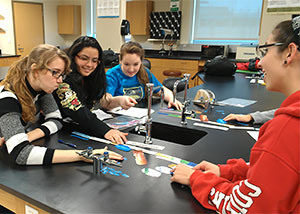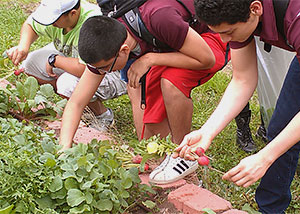Program Examines Interventions to Help Struggling Students

Students attending recitation sessions work on activities designed to reinforce key
concepts.Two introductory biology classes have high rates of students dropping the course or
making a D or F - General Biology for non-majors and Introductory Biology for science
majors.
Through a grant from the Texas Higher Education Coordinating Board, the Department of Biology and Biochemistry is implementing various interventions for students at risk for failure. The goal is to improve the students’ chances of completing the course and decrease the numbers of students making a grade of D or F or withdrawing (DFW) from the course.
“Freshman-level biology courses have high enrollments and consistently have the highest non-completion and failure rates of all the department’s courses,” said Dan E. Wells, director of the Comprehensive Student Success Program and NSM dean.
The two courses that are the focus of the grant have a 30-40 percent non-passing rate.
With the grant, now in its second year, the department began running courses in Fall 2012 that included interventions to combat the high rate of failure or withdrawal.
“For the two courses, we now have several sections that are implementation classes and a class that is a control group,” said Donna Pattison, co-director of the Comprehensive Student Success Program and instructional professor of biology and biochemistry. “In Spring 2014, one of two General Biology classes include the implementation tactics and three out of four Introductory Biology classes include them.” That represents 1,088 students in the implementation classes.
Sixteen faculty and staff members and 16 undergraduate majors serving as facilitators make up the student success program team. An additional 19 departmental faculty, postdoctoral students and graduate students have contributed to the program as field trip and lab tour leaders.
Intervention Plan for Low-Performing Students
The intervention component of the courses begins after the first exam. Students scoring below 70 percent are required to attend additional recitation sessions once a week. All students are invited to attend regardless of exam performance.
“We start the intervention immediately after the first exam to give students time to benefit from the additional instruction, adapt their study habits and time management, and develop a new approach toward learning,” Pattison said.
The following activities are part of the intervention program.
- Advising – one-on-one sessions with a faculty or staff member aimed at identifying specific factors, such as time management and lack of study skills, that are obstacles to academic success. A discussion of study strategies is always included.
- Peer-Led Recitation Sessions – Weekly small-group sessions with curriculum strategically designed to address difficult topics in biology and to simultaneously teach study skills. Sessions are led by junior or senior life science majors. Multiple sessions are available for students to fit their schedules.
- Field Trip – one on-campus or off-campus field trip designed to get students engaged with faculty in a smaller group setting is required for all students in the non-major’s course. Optional tours of labs in the Department of Biology and Biochemistry to introduce students to research and faculty are organized for students in the major’s biology course.
“We designed specific curriculum for the recitation sessions; it is not tutoring,” Pattison said. “The students work on activities that can be done in groups of four. They reinforce concepts learned in class, for instance, making models of meiosis and mitosis and explaining the process as they go through the model.”
Faculty Development

Students work in the UH Campus Garden during a program field trip.The department also implemented a faculty development program to review best practices
in teaching with a focus on moving from pure lecture formats to more interactive teaching
styles that engage students with the course material.
“In the first year of the program, we held two workshops a month using the Handbook of College Science Teaching as our guide and reviewed relevant chapters as a basis for discussion each time we met,” Pattison said. “The program continues on a monthly basis this year with a new book review.”
One new technique that is encouraged is “clicker questions.” “Students click in their answers to the question, and the instructor receives the answer responses in real time. You can immediately see if a key concept needs to be reinforced,” she said. “Clickers can also be used as you take a class through a case study.” Students are often encouraged to talk to each other to work out the answers.
Results Promising
“Students are doing better with the recitation,” Pattison said. Improvement for students attending recitation could be seen as early as after the second exam.
In the science major’s introductory biology course, results from the implementation courses were compared with the same instructor’s course the year prior to the start of the program.
“Only 30 percent of students who scored below 70 on the first exam in Fall 2011 managed to successfully complete the course,” Pattison said. “In Fall 2012, when recitation was required, 52 percent of the students scoring below 70 on the first exam successfully completed the course.” The data reflect a 22 percent improvement in outcomes.
Similar results were obtained in Fall 2014 in the major’s biology course with the scale-up to include a greater number of sections. The DFW rate for the department across all sections of the course in Fall 2013 was 10 percent lower than in 2011 prior to implementation of the Comprehensive Student Success Program.
“We intend to use the results in these courses as a model for future curriculum development in upper level courses,” Pattison said.
- Kathy Major, College of Natural Sciences and Mathematics